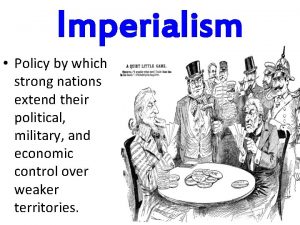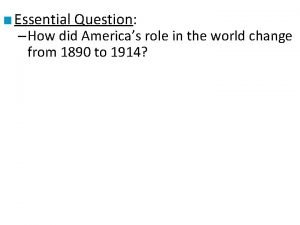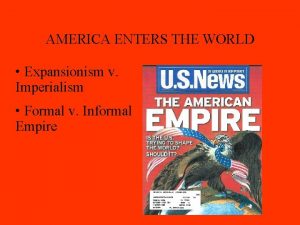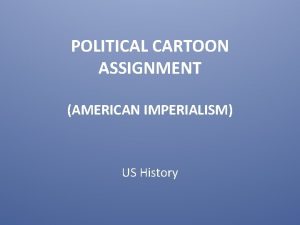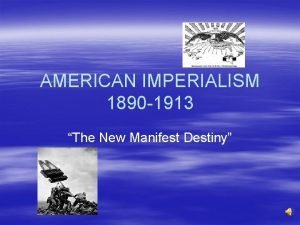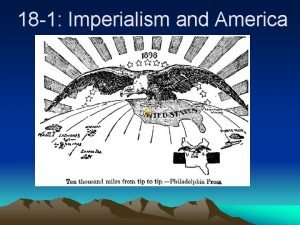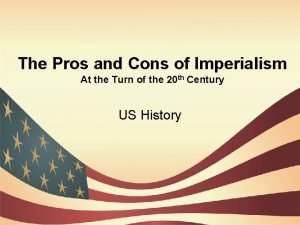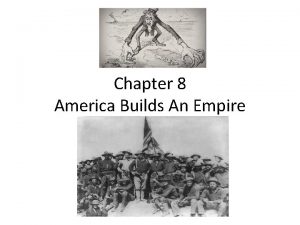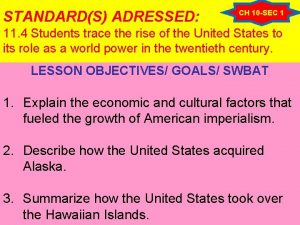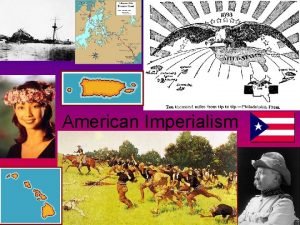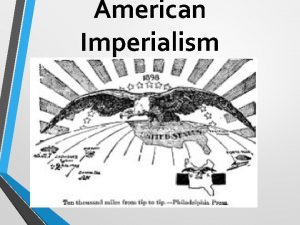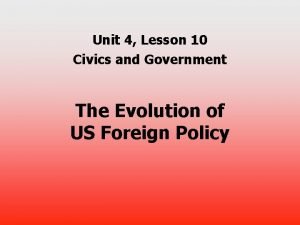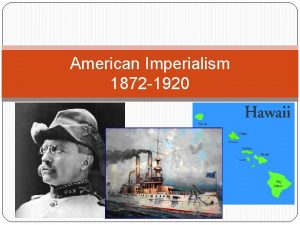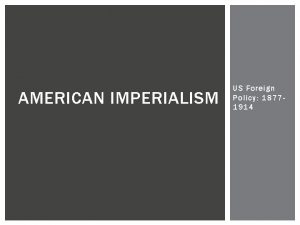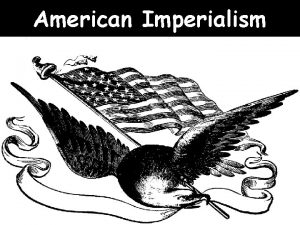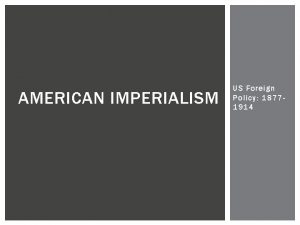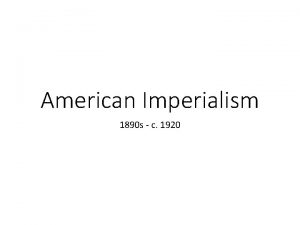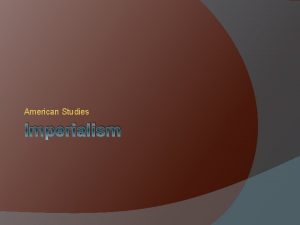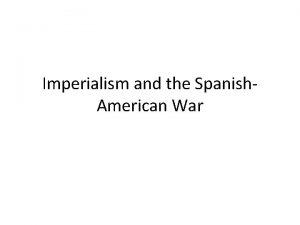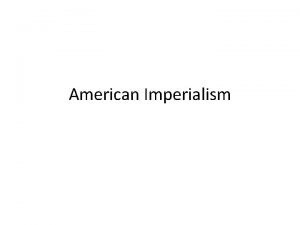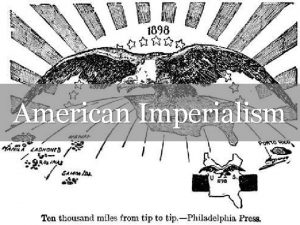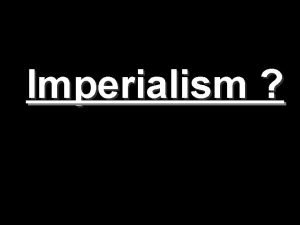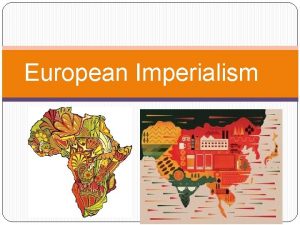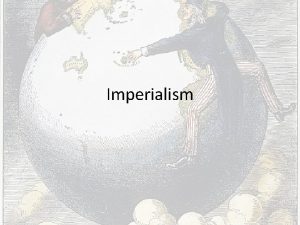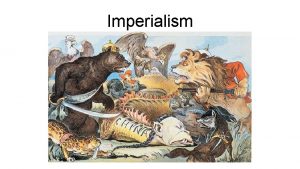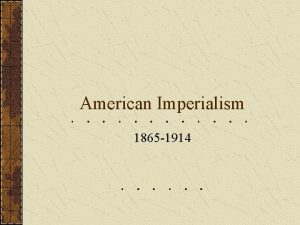American Imperialism What is Imperialism The policy in
















- Slides: 16

American Imperialism • What is Imperialism? – The policy in which stronger nations extend their economic, political, or military control over weaker territories. • Is expansion a common theme in American History? – What is the term associated with this? • Should we consider the removal of Native Americans as an act of Imperialism? • Or is it only imperialism when we have to get on a boat?

Historical Causes of Imperialism • Monroe Doctrine – – • Manifest Destiny – – • American Democracy is best form of government “The flag follows trade, Soldiers follow the flag” Alfred T. Mahan – – • 1817 - Tells Europe to stay out of the Western Hemisphere Suggests that Latin America is a vital US interest Father of the modern US Navy Argued in favor of aggressive expansion in the Pacific Teddy Roosevelt – – – Progressive Champion at home Imperialist aggressor abroad Great White Fleet – sent newly built Navy ships around the world to show U. S. strength GQ: Explain the historical causes of American Imperialism.

Virgin Islands Wake Island Kingman Reef Midway Islands Johnston Atoll American Samoa Baker Island Guam Howland Island Jarvis Island Navassa Island Northern Mariana Islands Palmyra Atoll Puerto Rico

Global Competition • European Nations had been establishing colonies for centuries. • In the late 19 th century, Africa was their prime target. • Imperialists also competed for territory in Asia, especially China. • Most Americans gradually accepted the idea of expansion overseas. This stemmed from the idea of manifest destiny. • Three factors fueled the new American Imperialism – Desire for military strength – Thirst for new markets – Belief in cultural superiority. GQ: Explain the three reasons behind American Imperialism.

Military Superiority • America prided itself as being above the petty wars of Europe—citizen army vs. professional army • Alfred T. Mahan—Influence of Sea Power on World History 1660 -1783 – Build a canal in Latin America – Build modern and powerful navy – Acquire islands in the pacific as naval bases • The construction of the Maine, Oregon and several other large modern battleships transformed the U. S. into the world’s 3 rd largest naval power. GQ: Explain the three reasons behind American Imperialism.

New Markets • Industrial Age enabled farms and factories to produce more than U. S. consumers could consume. • This left the U. S. in need of raw materials for its factories and new markets for its goods. • Is Foreign Trade the answer? – In order to keep so many Americans working in the factories and in order to keep improving their working conditions via Progressivism, Imperialism would be necessary. GQ: Explain the three reasons behind American Imperialism.

What does American Imperialist Action teach us about America’s Economic Philosophy? • The US Economy Relies on Growth • If an area is closed to U. S. products, ideas or people, U. S. survival is threatened. • The US has the right to intervene in any country to keep markets open GQ: Explain the three reasons behind American Imperialism.

Cultural Superiority • Cultural factors were also used to justify imperialism. • Combined Social Darwinism (survival of the fittest) with the belief in racial superiority of Anglo. Saxons. • They argued that the United States had a responsibility to spread Christianity and “civilization” to the “inferior people” of the world GQ: Explain the three reasons behind American Imperialism.

Roosevelt Corollary to Monroe Doctrine "Any country whose people conduct themselves well can count upon our hearty friendship. Chronic wrongdoing, however, . . . may force the United States to exercise an international police power. " “There is a homely adage which runs, "Speak softly and carry a big stick; you will go far. " If the American nation will speak softly and yet build and keep at a pitch of the highest training a thoroughly efficient navy, the Monroe Doctrine will go far. ”

Roosevelt Corollary - US could interfere in Latin America to preserve law & order - Made US a police power - Nicknamed “Gun Boat Diplomacy” GQ: How did Roosevelt assert American power?

Expansion of U. S. • Alaska: – 1867 - Bought Alaska from Russia for 2 cents an acre ($7. 2 million) • Wanted for Lumber, Wildlife • Americans found gold, silver, oil, & made $ • Hawaii: – 1898 – Annexed: Queen Liliukalani gives up territory completely in 1900 • Good for crops like sugar, pineapple, & coconuts

A “Splendid Little War” • Spanish-American War: – Cuba is close to the U. S. – U. S. has economic investments on the island – Cuba was looking for freedom from Spain – U. S. S. Maine – • February 15, 1898: The U. S. S. Maine exploded in the harbor of Havana • US Newspapers blame the Spanish for sinking the ship – Yellow Journalism - sensationalist news reporting meant to sway public opinion – Hearst and Pulitzer had been trying to lure and enrage readers by writing exaggerated news • Led Mc. Kinley to ask Congress to declare war GQ: How did the U. S. gain control of former Spanish Colonies?

A “Splendid Little War” • Spanish-American War: – A global war: Fought physically in – the Philippines, Guam, Puerto Rico & Cuba – Treaty of Paris (1898): • • Ends Spanish-American War Freed Cuba from Spain Guam and Puerto Rico given to the United States Philippines sold to the U. S. for $20 million GQ: How did the U. S. gain control of former Spanish Colonies?

Puerto Rico Relationship Control would lead to: Laws/policies Violent action Cuba The Philippines China

Puerto Rico Cuba The Philippines China Relationship Colony/US Territory Protectorate: similar to colony, sort of Independ. Control would lead to: Location to the US=strategic importance Protect US business interest Provide the US with raw materials and new markets Establish and protect new markets for us products Laws/policies Treaty of Paris Foraker Act Platt Amendment Treaty of Paris/ “removal policies" Open Door Policy Spanish American War/ 3 uprisings that led to US occupation Spanish American War Philippine. American War Boxer Rebellion Violent action Colony/US territory “Trading Partner”

What is the Open Door Policy? • Based on US Secretary of State John Hay’s Open Door Notes where he suggests to the Imperialist countries of Europe that instead of competing in China, they all need to work together to exploit China. – That way all the nations of Europe can make money.
 Old imperialism vs new imperialism
Old imperialism vs new imperialism Old vs new imperialism chart
Old vs new imperialism chart Imperialism refers to the policy in which strong nations
Imperialism refers to the policy in which strong nations Foreign policy imperialism
Foreign policy imperialism Foreign policy imperialism
Foreign policy imperialism How has the us changed from 1798 to 1898
How has the us changed from 1798 to 1898 American imperialism definition
American imperialism definition The roots of american imperialism 1. economic roots
The roots of american imperialism 1. economic roots American imperialism pros and cons
American imperialism pros and cons Chapter 8 imperialism
Chapter 8 imperialism Expansionism
Expansionism What three factors spurred american imperialism
What three factors spurred american imperialism American imperialism political cartoons explained
American imperialism political cartoons explained Alaska american imperialism
Alaska american imperialism American imperialism 1800s
American imperialism 1800s Roots of american imperialism
Roots of american imperialism Unit 4 lesson 10 american foreign policy
Unit 4 lesson 10 american foreign policy


